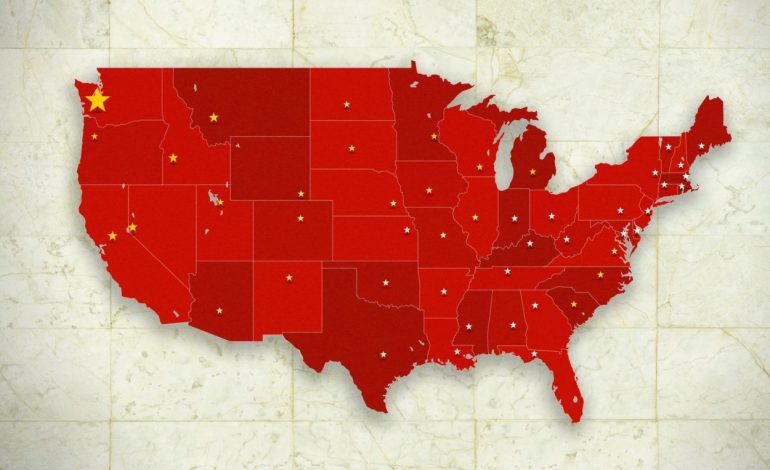
All Over the Map
By Emily de La Bruyere and Nathan Picarsic
U.S. GOVERNORS CONSIDERED “FRIENDLY” TO CHINA IN THE MINZHI-TSINGHUA REPORT
Alabama: Kay Ivey
Arizona: Doug Ducey
Colorado: Jared Polis
Delaware: John Carney
Idaho: Brad Little
Indiana: Eric Holcomb
Maine: Janet Mills
Massachusetts: Charlie Baker
Montana: Steve Bullock
New Hampshire: Chris Sununu
North Carolina: Roy Cooper
North Dakota: Doug Burgum
Oregon: Kate Brown
Tennessee: Bill Lee
Utah: Gary Herbert
Vermont: Phil Scott
West Virginia: Jim Justice
Across the political spectrum, Americans are moving toward a consensus that China’s authoritarian regime poses the foremost threat to U.S. national security. Under the firm control of the Chinese Communist Party (CCP), the People’s Republic of China presents a challenge that goes well beyond the military, or even the technological, domain. Beijing seeks to shape global architectures, and through them to assert global control. Beijing’s ambitions are evident in its efforts to set global technical standards and control emerging infrastructure, to convert foreign dependence on Chinese resources and manufacturing capabilities into market-making power, and to influence international opinion through disinformation and propaganda.
These efforts target the public and private sectors. And in its efforts to influence governments, including the U.S. government, Beijing does not limit itself to the national level. Beijing also runs systematic campaigns to influence subnational — that is, state and local — governments.
Beijing understands that subnational political leaders respond to different incentives than do federal officials and authorities — and that those incentives may create favorable conditions for China’s influence campaigns. States and localities often prioritize the creation of jobs and economic growth, with less concern for national security risks. Beijing appeals to such economic interests to shift attitudes, open doors for China and Chinese entities, and foster relationships that can offset growing resistance in Washington to Beijing’s global agenda. Success on this score brings strategic and security returns for the CCP. It also obscures the extent to which short-term boons from economic cooperation may lead to long-term losses for the United States by hollowing out key industrial sectors and gradually offshoring jobs and economic growth.
In June 2019, the Minzhi International Research Institute, a Chinese think tank,1 and Tsinghua University’s Center of Globalization Studies published a survey of U.S. governors’ attitudes toward China. The report clearly articulates the logic of cultivating state and local officials as a counterweight to Washington’s increasing concern about China’s national security threat:
“In Washington, voices advocating a tough stance on China seem to have become mainstream and have growing momentum. [However,] in American politics, in addition to the White House and Congress, there is another type of decisive actor: the governors. Because of the federal system in the United States, governors can ignore the White House’s orders… And each federal member enjoys a certain degree of diplomatic independence… Therefore, as Washington’s overall attitude towards China toughens, the attitudes of the states are crucial.”
Based on public statements, the Minzhi-Tsinghua survey finds that “among the 50 governors, 17 are friendly to China, 14 have ambiguous attitudes toward China, six are tough on China, and 14 have made no clear or public statement on China.” The report argues that “hardline” stances among U.S. governors are overwhelmingly human rights-related “and rarely involve economic and trade issues.”


